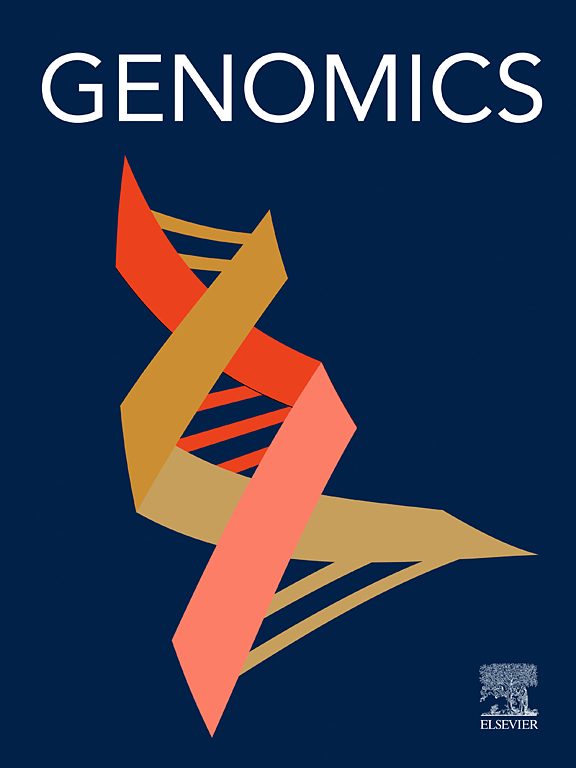母体日粮纤维含量的差异影响胎儿和仔猪基因表达模式和染色质可及性。
IF 3.4
2区 生物学
Q2 BIOTECHNOLOGY & APPLIED MICROBIOLOGY
引用次数: 0
摘要
本研究探讨了不同纤维含量的母体妊娠饲粮对断奶后饲喂低纤维饲粮的胎儿和仔猪基因表达和染色质可及性的影响。研究人员将富含甜菜果肉或豌豆内部纤维的高纤维孕妇饮食与低纤维孕妇饮食进行了比较,以评估它们对肝脏和肌肉组织的影响。结果表明,母体高纤维饲粮显著改变了胎儿和仔猪的染色质可及性,预测了转录因子活性和转录景观。一项基因集富集分析显示,在妊娠期饲喂高纤维日粮的母猪的仔猪中,与代谢过程相关的基因本体术语过表达,而与免疫反应相关的基因本体术语过表达。这表明胎儿和后代有更好的代谢健康和免疫耐受,与文献记载的短链脂肪酸对免疫和代谢途径的表观遗传作用一致。使用来自成年猪单细胞转录组图谱的细胞类型特异性标记对大量RNA-seq数据进行反卷积分析。这些结果证实,转录组学和染色质可及性数据并不反映母亲饮食组之间细胞类型组成的不同,而是母亲营养在塑造胎儿和后代的表观遗传和转录环境中引发的表型变化。我们的研究结果对改善动物健康和生产力以及对人类健康有更广泛的影响,表明优化高纤维含量的母亲饮食可以增强出生后成长期乃至成年期的代谢健康和免疫功能。本文章由计算机程序翻译,如有差异,请以英文原文为准。
Differences in maternal diet fiber content influence patterns of gene expression and chromatin accessibility in fetuses and piglets
This study investigates the impact of maternal gestation diets with varying fiber contents on gene expression and chromatin accessibility in fetuses and piglets fed a low fiber diet post weaning. High-fiber maternal diets, enriched with sugar beet pulp or pea internal fiber, were compared to a low-fiber maternal diet to evaluate their effects on liver and muscle tissues. The findings demonstrate that maternal high-fiber diets significantly alter chromatin accessibility, predicted transcription factor activity and transcriptional landscape in both fetuses and piglets. A gene set enrichment analysis revealed over-expression of gene ontology terms related to metabolic processes and under-expression of those linked to immune responses in piglets from sows given the high-fiber diets during gestation. This suggests better metabolic health and immune tolerance of the fetus and offspring, in line with the documented epigenetic effects of short chain fatty acids on immune and metabolic pathways. A deconvolution analysis of the bulk RNA-seq data was performed using cell-type specific markers from a single cell transcriptome atlas of adult pigs. These results confirmed that the transcriptomic and chromatin accessibility data do not reflect different cell type compositions between maternal diet groups but rather phenotypic changes triggered by maternal nutrition in shaping the epigenetic and transcriptional environment of fetus and offspring. Our findings have implications for improving animal health and productivity as well as broader implications for human health, suggesting that optimizing maternal diet with high-fiber content could enhance metabolic health and immune function in the formative years after birth and potentially to adulthood.
求助全文
通过发布文献求助,成功后即可免费获取论文全文。
去求助
来源期刊

Genomics
生物-生物工程与应用微生物
CiteScore
9.60
自引率
2.30%
发文量
260
审稿时长
60 days
期刊介绍:
Genomics is a forum for describing the development of genome-scale technologies and their application to all areas of biological investigation.
As a journal that has evolved with the field that carries its name, Genomics focuses on the development and application of cutting-edge methods, addressing fundamental questions with potential interest to a wide audience. Our aim is to publish the highest quality research and to provide authors with rapid, fair and accurate review and publication of manuscripts falling within our scope.
 求助内容:
求助内容: 应助结果提醒方式:
应助结果提醒方式:


